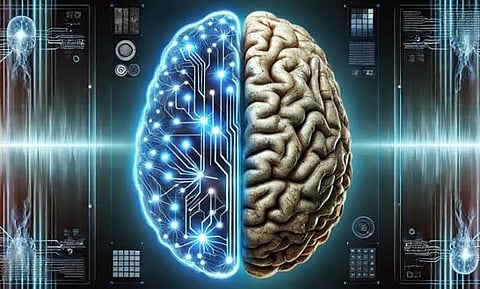UAE researchers create AI systems that predict dementia and Alzheimer's
Dementia is one of the major healthcare challenges of our time,” said Dr. Yaqub

A research team from Mohamed bin Zayed University of Artificial Intelligence (MBZUAI) and Sheikh Shakhbout Medical City has developed two new artificial intelligence systems designed to help doctors detect cognitive decline disorders (dementia) earlier and with greater accuracy than currently possible.
The two systems are based on graph neural networks (GNNs)—an emerging deep learning architecture capable of processing multi-modal medical data while providing interpretable results. This interpretability, researchers explained, is vital in healthcare settings, as physicians must understand how AI systems reach their conclusions in order to make informed clinical decisions.
The results were presented at the 28th International Conference on Medical Image Computing and Computer-Assisted Intervention (MICCAI), held in Daejeon, South Korea, according to Dr. Mohamed Yaqub, Associate Professor of Computer Vision and Machine Learning at MBZUAI, and a co-developer of the two systems.
“Dementia is one of the major healthcare challenges of our time,” said Dr. Yaqub on MBZUAI’s official website. “These new models have the potential to support clinicians in improving patient care across all stages of the disease.”
First Model: Classifying Dementia patients
Dr. Yaqub explained that the first system, called ClinGRAD, is a graph neural network that classifies dementia patients into three categories: mild cognitive impairment, vascular dementia, and Alzheimer’s disease.
Differentiating between these subtypes is notoriously difficult, with 20–30% of patients misdiagnosed, often leading to premature mortality and reduced quality of life.
ClinGRAD mirrors the way physicians interpret medical data by focusing on biological markers of dementia, such as structural changes in specific brain regions observable through MRI scans and gene co-expression networks.
The model achieved an impressive 98.75% accuracy on a benchmark dataset—significantly outperforming existing diagnostic methods.
Dr. Yaqub noted that dementia—including Alzheimer’s and vascular dementia—currently affects around 55 million people worldwide, a number expected to triple by 2050.
Second model: Early detection of Alzheimer’s Disease
Salma Hassan, a PhD candidate in machine learning at MBZUAI and a co-developer of the systems, explained that both models were designed to provide physicians with accurate and interpretable diagnostic tools.
The second system, called MAGNET-AD, employs a graph neural network to detect Alzheimer’s disease before symptoms appear. It predicts both a patient’s cognitive performance score (PACC) and the time to disease onset by analyzing longitudinal data—including brain scans, genetic information, and electronic health records.
MAGNET-AD can identify early indicators of Alzheimer’s years before clinical symptoms emerge, making it the first interpretable framework to integrate spatial, temporal, and multi-modal data into a single cohesive model.
The system achieved a C-index of 0.8582, significantly outperforming the next-best model (0.8041).
Both ClinGRAD and MAGNET-AD were designed with interpretability in mind, fostering greater trust and collaboration between AI systems and medical professionals.
Empowering, not replacing, doctors
Hassan emphasized that the goal of the two models is to empower physicians—not replace them—by providing richer, data-driven insights to support their diagnoses.
The development team also included Dr. Mustafa Salem, Postdoctoral Research Fellow in Computer Vision at MBZUAI; Dr. Vijay Ram Kumar Bapineni, Consultant Radiologist at Sheikh Shakhbout Medical City; and Dr. Ayman El-Sayed, Senior Consultant Radiologist at the same institution.
Looking ahead, the researchers plan to test their models on more diverse datasets and expand them to incorporate additional biological data types, paving the way for broader clinical applications in the fight against dementia and Alzheimer’s disease.
Sign up for the Daily Briefing
Get the latest news and updates straight to your inbox



